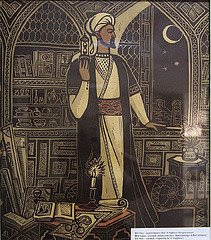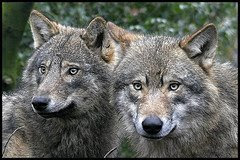"I have seen flocks [of passenger pigeon] streaming south in the fall so large that they were flowing from horizon to horizon in an almost continuous stream all day long, at the rate of forty or fifty miles an hour, like a mighty river in the sky,..." From The Story of My Boyhood and Youth, by John Muir, 1913
***
Aims: Categorizing information, TOEFL iBT academic speaking practice, persuading, suggestions, and negotiations.

Black Stilt (Himantopus novaezelandiae)
The black stilt (Himantopus novaezelandiae) of New Zealand is the rarest wading bird in the world and classed as "critically endangered" by the IUCN. In 2002 there were only 11 breeding pairs and a total of 84 individuals remaining in the wild. In 1998 the New Zealand Department of Conservation was spending $4 million per year in trying to save it and its habitat. It is possible that it is already extinct having been hybridised out of existence by interbreeding with its close relative the pied stilt (see The Ethnic Cleansing of Nature).
Vocabulary
stilt: long legged shore bird; cf stilts: wooden leg extensions
wading: walking in water
breeding: reproducing
the wild: not in captivity
pied: black and white
Discussion
Is the Department of Conservation wasting its time and money in trying to save the black stilt?
Reading and Speaking
Each student is responsible for reading one of the following texts. The task is to form a study group in which each student communicates the contents of their reading in their own words to the others. Students use this information and complete the table below with the names of species.
iBT TOEFL Training Optional Speaking Exercise
In the speaking section of the Internet Based TOEFL you will be given a text of approximately 100 words to read. The text will have a question that goes with it. You will have 45 seconds to read the text (i.e. just over 2 words per second), then 30 seconds to prepare your answer, and finally 60 seconds to record your answer (Sharpe, 2006 p.246).
To practise for this part of the test work with a partner. One of you reads and answers the question, while the other works as the time keeper and coach. The time keeper should have read the text as well, so that they can comment on your accuracy.
Please note, the readings below are sometimes longer or shorter than 100 words; however, you have proportionally the same time.
_________________________________
Table 1 Instrumental value of species
_________________________________
Goods:
_________________________________
Services:
_________________________________
Knowledge:
_________________________________
Psycho-spiritual: The giant panda
_________________________________
1. Instrumental Value
Text 1
The instrumental, anthropocentric or utilitarian value of things all refer to the idea that the worth of something is dependent on how much it is useful for the benefit of humans. Instrumental value of plants and animal can be divided into four categories:goods, services, knowledge and the psycho-spiritual.
Let's look at each one. 'Goods' refer to the use of other life forms as fuel, fibre or medicine. 'Services', include pollination, nutrient recycling and global homeostasis. 'Knowledge' is the notion that every species has something interesting about it, and the extinction of an organism before it can be studied is like burninng a book or part of library that you have never read. Finally, the 'psycho-spiritual' value of an organism is what it contributes to our sense of well being (Meffe, et al, 1997).
136 words. Reading time: 61 seconds .
Question: What is the instrumental value of an organism?
Now consider the following extracts and decide whether they are to do with goods, services, knowledge or the pyscho-spiritual.
***
Text 2
'I found out a good many years back practically all I need to know about my general reader; that is to say, you, I'm afraid. You'll deny it up and down, I fear, but I'm really in no position to take your word for it. You're a great bird-lover. ... [Y]ou're someone who took up birds in the first place because they fired your imagination; they fascinated you because 'they seemed of all created beings the nearest to pure spirit- those little creatures with a normal temperature of 125°'. Probably... you thought many thrilling related thoughts; you reminded yourself, I don't doubt, that: 'The gold crest, with a stomach no bigger than a bean, flies across the North Sea! The curlew sandpiper, which breeds so far north that only about three people have ever seen its nest, goes to Tasmania for its holidays!' (Salinger,1959)
182 words. Reading time: 1 minute 22 seconds
Question: What kind of things does the writer hope will inspire his "general reader"?
***
Text 3
'Critics of environmentalism...usually wave aside the small and unfamiliar, which they tend to classify into two categories, bugs and weeds. It is easy for them to overlook the fact that these creatures make up most of the organisms and species on Earth. They forget, if they ever knew, how the voracious caterpillars of an obscure moth from the American tropics saved Australia's pastureland from overgrowth of cactus; how a Madagascar "weed", the rosy periwinkle, provided the alkaloids that cure most cases of Hodgkin's disease and acute childhood leukemia; how another substance from an obscure Norweigian fungus made possible the organ transplant industry; how a chemical from the saliva of leeches yielded a solvent that prevents blood clots during and after surgery; and so on through the pharmacopoeia that has stretched from the herbal medicines of Stone Age shamans tot he magic-bullet cures of present day biomedical science.' (Wilson, 2006 p.30-31)
154 words. Reading time: 1 minute 10 seconds
Question: Explain why we should care about tiny and little known organisms.
***
Text 4
'The passenger pigeon, or wild pigeon, as it was often called, is generally believed by ornithologists to be extinct. Of the mighty hosts of this splendid bird that swarmed over the country [The United States], not a single individual is thought to remain alive to-day, and yet within the memory of men not yet old, the bird was well known, and the possibility of its extinction was far from their thoughts. Indeed, whenever laws were proposed for conserving the bird, the cry at once went up that it needed no protection, for its numbers and the extent of country over which it ranged were both so huge that protection seemed unnecessary. Even the tardy protective laws passed by some States were largely disregarded.
At last, in 1910, 1911, and 1912, when it was too late, attempts were made to save the bird, and rewards that totaled more than $1,000 were offered for evidence that it was living and nesting-the live bird, not the dead one was sought. But it was all in vain. The passenger pigeon appears to have gone the way of the dodo and the great auk." (Townsend, 1932)
190 words. Reading time: 1 minute 26 seconds.
Question: Explain why the legal protection of the passenger pigeon failed.
***
Text 5
'We may never personally glimpse certain rare animals -wolves, ivory -billed woodpeckers, pandas, gorillas, giant squid, great white sharks, and grizzlies come to mind - but we need them as symbols. They proclaim the mystery of the world. They are jewels in the crown of the Creation. Just to know they are out there and well is important to the spirit, to the wholeness of our lives. If they live, then Nature lives. Surely our world will be secure, and we will be better for it. Imagine the shock of the following headline: LAST TIGER SHOT, SPECIES NOW EXTINCT.' (Wilson,2006)
100 words. Reading time: 45 seconds.
Question: Explain Wilson's argument for protecting rare animals such as the giant squid and the great white shark.
***
Text 6
'Insofar as environmentalists believe that the experience of nature is a necessary condition for developing a consistent world view, one that fully recognises man's place as a highly evolved animal whose existence depends on a fully functioning ecosystem, they also believe that such experiences have a transformative value. Experience of nature can promote questioning of and rejection of overly materialistic and consumptive felt preferences' (Norton, 1987, p.189 ).
68 words. Reading time: 31 seconds
Question: What two things do environmentalists think contact with the natural world can do for people?
***
Text 7
Ecosystem services are the natural processes that keep humans alive (Krebs, 2000). They include such things as: water and air purification, nutrient cycles, seed dispersal, the ozone layer that shields us from harmful ultraviolet rays, pollination of crops by bees and other organisms, and so on (see Krebs( 2000) and Campbell & Reece( 2005 ) for a complete list). They have enormous value, and without them our societies would simply collapse (Meffe, et al, 1997). For example, Albert Einstein is reported to have said: "If the bee disappears from the surface of the earth, man would have no more than four years to live. No more bees, no more pollination … no more men!” It is widely believed that the ability of the earth to performs these services hinges on biodiversity. That is, each species participates in one way or another in the health and stability of ecosystems necessary to sustain us. Loss of species through human activity leads to a deterioration of these vital processes and hence poses a grave threat to human existence(Campbell & Reece, 2005; Lovelock, 2006).
177 words. Reading time: 1 minute 20 seconds
Question: Why is biodiversity necessary for the maintenance of human society?
Text 8
Biodiversity hotspots were first defined by biogeographer N. Myers in 1988. They are areas of exceptionally high endemism (that is, of species found nowhere else in the world) combined with an unusually high threat of destruction. In 1997, 18 hotspots were identified, 14 of which are found in tropical forests (Meffe et al, 1997 p. 141). There are now 34 hotspots containing around 75% of the Critically Endangered Species as listed by the IUCN (Bowen, 2009). Over the past 50 years 90% of the world's armed conflict has occurred countries containing hotspots, and 80% occurred in the hotspots themselves (Mittermeier, et al 2009). Even though natural resource competition is a factor in the generation of war (Hinde and Rotblat, 2003), the authors are reluctant to attribute this, or any other cause, for the strong correlation between biodiversity hotspots and war. They are more concerned about highlighting the urgent need for peace in these areas, notably as war exacerbates wildlife loss. For example, during the conflict in the DRC, Virunga lost 95% of its hippos.
170 words. Reading time: 1 minute 17 seconds
Question: What are biodiversity hotspots, and what is the relationship between them and war?
Answers
Persuasion
You are an engineer working on the construction of a hydroelectric dam. You discover that the site is host to a number of endemic and rare species of plants and birds. Persuade your colleagues to either ignor the data or to consider moving the proposed site or halting it all together.
Further Reading The Passenger Pigeon
References
Bowen, L. (2009) The Hottest Spots: Conservation in War Zones , Conservation International.org
Cambell,N.A. and Reece, J.B. (2005) Biology, Seventh Edition. Benjamin Cummings, San Francisco, p.1212
Hind, R. & Rotblat, J. (2003) War No More. Pluto Press. London. p.86
Krebs, C.J. (2000) Ecology. Fifth Edition. Benjamin Cummings, San Francisco p.603
Lovelock, J. (2006) The Revenge of Gaia
Meffe et al, 1997, Principles of Conservation Biology, Sinauer, Massachusetts, p.31
Mittermeier, R.A., Machlis, H. & G., Brooks, T., Fonseca, G., Hoffmann, M., Lamoreux, J.F., Mittermeier, C., Pilgrim, J.D. (2009) 'Biodiversity Hotspots and Warfare.' Conservation Biology.
Muir, J. (1913) The Story of My Boyhood and Youth. Houghton Mifflin Company. Boston. p. 159.
Norton, B.G. (1987) Why Preserve Natural Variety? Princeton University Press, Princeton, New Jersey, p.189
Salinger, J.D. (1959) Seymour: An Introduction. The New Yorker, June 6, 1959
Sharpe, P. (2006) Barron's TOEFL iBT Internet Based Test 2006-2007, 12th Edition, Barron's New York.
Townsend, C.W. (1932) 'The Passenger Pigeon.' Life Histories of North American Gallinaceous Birds: Orders Galliformes and Columbiformes. Arthur Cleveland Bent, U.S. Govt. Print. Off.. Washington, DC. p.379.
Wilson, E.O. (2006) The Creation. W.B.Norton & Co., New York, London. pp. 57-58
Wilson, E.O and Kellert, S (1990) The Biophilia Hypothesis. Island Press p.31
Photos
Nature, Art & Language
© All Copyright, 2007, Ray Genet









+II+-+socialist+art+by+night+_eulen.jpg)








